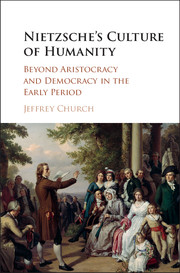Book contents
- Frontmatter
- Dedication
- Contents
- Preface
- List of abbreviations
- Introduction
- PART I The Foundation of Culture in the Early Nietzsche
- Part II Two Concepts of Culture in the Early Nietzsche
- 4 Nietzsche's Exemplary Individuals
- 5 National Culture
- 6 Cosmopolitan Culture
- PART III The Means to Culture in the Early Nietzsche
- PART IV The Significance of the Early Period
- Bibliography
- Index
5 - National Culture
from Part II - Two Concepts of Culture in the Early Nietzsche
Published online by Cambridge University Press: 05 October 2015
- Frontmatter
- Dedication
- Contents
- Preface
- List of abbreviations
- Introduction
- PART I The Foundation of Culture in the Early Nietzsche
- Part II Two Concepts of Culture in the Early Nietzsche
- 4 Nietzsche's Exemplary Individuals
- 5 National Culture
- 6 Cosmopolitan Culture
- PART III The Means to Culture in the Early Nietzsche
- PART IV The Significance of the Early Period
- Bibliography
- Index
Summary
Thus far, we have reconstructed Nietzsche's argument that the best or most excellent human life – that which can achieve the ends of our contradictory teloi – is the life of the exemplary individual. What remains for us to discuss is how this ideal can be realized. Throughout his early period work, Nietzsche upholds culture (Kultur) as a community devoted to cultivating the good life. For instance, Nietzsche speaks of the “goal of all culture” (Ziel aller Kultur) as the “procreation [Erzeugung] of genius” (UM.3.3) and as the “production of true human beings [wahren Menschen] and nothing else” (UM.3.6, Nietzsche's emphasis). Nietzsche envisions a
mighty community held together, not by external forms and regulations, but by a fundamental idea [Grundgedanken]. It is the fundamental idea of culture [Kultur], insofar as it sets for each one of us but one task: to promote the production [Erzeugung] of the philosopher, the artist, and the saint within us and without us and thereby to work at the perfecting [Vollendung] of nature.
(UM.3.5)Nietzsche's views of the motivation for and purpose of culture are indebted to Herder and Kant's transformation of the notion of culture. For Nietzsche, as for Herder and Kant, modern civilization contains many associations formed to advance animalistic or materialistic aims that dehumanize us. Instead of turning back to religion to combat these modern tendencies, these thinkers developed and advanced a modern concept of community devoted to cultivating the distinctively human element in us, our freedom.
The purpose of this community, then, is clear. But what is the nature and structure of this community such that it can achieve this purpose? Our first task, the subject of this chapter and the next, is to understand the nature of this community. I oppose my view to the two prominent understandings of Nietzsche's early period view of culture, the “aristocratic” and “democratic” readings. According to the former view, culture aims to perfect fixed natural differences, and hence it is structured so as to forcibly redistribute goods from the many to the few, from the base to the noble. By contrast, the latter view envisions culture as an agonistic struggle through which each can pursue his own authentic excellence. As we have seen already, both approaches grasp only a partial truth. The aristocrats rightly recognize the inegalitarian nature of Nietzsche's view of culture, but they are wrong about the character of this inequality.
- Type
- Chapter
- Information
- Nietzsche's Culture of HumanityBeyond Aristocracy and Democracy in the Early Period, pp. 121 - 145Publisher: Cambridge University PressPrint publication year: 2015



